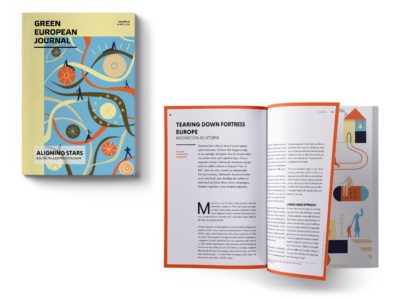Forged in the depths of systematic oppression, the Kosovars’ staunch support for the EU reflects their desire for democracy. The bloc should stop using it as a bargaining chip.
In mid-October, European and Western Balkans leaders gathered in Tirana for the latest Berlin Process Summit. The initiative is intended to foster cross-regional cooperation and demonstrate commitment to the region’s future in the European Union. But in Pristina, it was a statement by French President Emmanuel Macron that set off a storm.
That day, Kosovar citizens heard that Kosovo’s visa liberalisation – expected to begin in January 2024 after years of disappointment and delay – was again suspended. Within a few hours, the statement was clarified. Somewhat unclear French and a mistranslation had triggered a false alarm. Albeit 13 years after the same right was recognised for all other countries in the region, Kosovars will finally travel visa-free in Europe’s Schengen area.
However, the speed at which many Kosovars took the misconstrued statement at face value spoke to a concerning reality. When it comes to the EU, the feeling of so many Kosovars has become infused with distrust. Today, the EU is increasingly seen through the lens of injustice, with the expectation of being let down constantly lurking in the background.
Such sentiments derive from experience, and the 10-year visa liberalisation process is just one example. The bloc’s political approach toward the “normalisation of relations” dialogue between Kosovo and Serbia is another. Since 2011, the EU has been arbitrarily selective as to what, and when, it chooses to call out “non-compliance” within the dialogue framework – and especially how and toward whom. This selectiveness has intensified in the past couple of years. Serbia’s escalating attempts to undermine Kosovo’s sovereignty are increasingly appeased, while Kosovo is expected to remain nothing short of fully compliant to the point of servitude.
Although Macron’s statement was not about suspending Kosovo’s visa liberalisation, its mention was steeped in the language of political bargaining. Despite the visa decision having already been made, he again linked it to political conditionality – that Kosovo must show gratitude, that it should pay back its debt to the EU for recognising this right for its citizens, and that it should do so by engaging in the dialogue in the manner that the EU expects.
For Kosovars, it has become clear that the EU has embraced a narrow practice of politics, that of quid pro quo. For Macron, the “trade” is between a right (freedom of movement) and submissiveness. For Miroslav Lajčák, the EU’s Special Representative for the dialogue, it is similar: he gets to choose which past agreements are deal breakers and which can be swept under the carpet for political expedience. In doing so, he appears to assume unchallenged power to dictate that Kosovo has no European future based on his interpretation alone.
By and large, Kosovars have become accustomed to such EU behaviour. Yet despite it all, they continue to be among the staunchest supporters of the EU and the integration process. This ambition is not without context and dates back even to before the EU officially promised the region a glorious future in the “family of nations” in the early 2000s. It is an ambition forged in Kosovo’s darkest depths of systematic oppression; a desire for a distant ideal of democracy.
Such enthusiasm and belief should not be mistaken for naïveté. Kosovars are acutely aware of the need for a continuous negotiation of what constitutes governance for all its citizens, and in turn, expect to be treated fairly.
It is the EU that appears to have lost its way. If this kind of EU political behaviour is legitimised, and if the feeling of distrust and the expectation of being let down by the EU are normalised, then European values of equality, freedom, and human dignity are at risk.
Those values are the core ideals and principles upon which Europe was built and towards which it once aspired. Kosovars hope that the EU will return to them soon.

